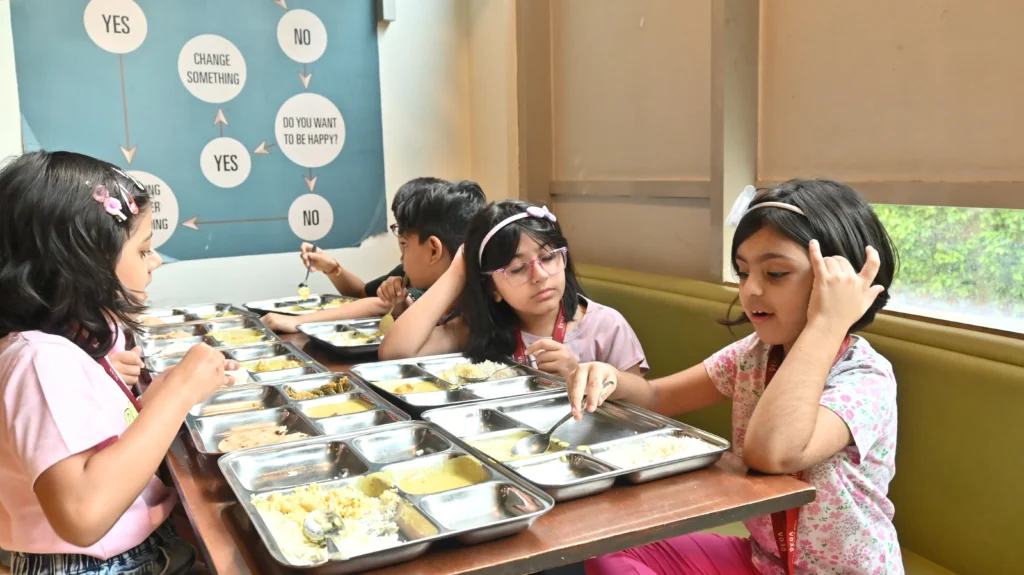Winter has a warm, inviting quality, but it also brings cold weather, shorter days, and the need to stay inside. It might be difficult for kids to stay motivated and focused during this time of year. Sluggishness, decreased physical activity, and cravings for unhealthy comfort foods are common outcomes of cold weather. But a healthy winter diet can make all the difference. Vitamin- and protein-rich foods, along with those naturally high in warmth, boost immunity, enhance focus, and maintain vitality. Adopting healthy, seasonal eating habits guarantees that children stay engaged, vigilant, and driven throughout the winter—both in the classroom and at play.
1. Warm Breakfasts for Long-Lasting Vitality
A healthy breakfast establishes the mood for the day. Complex carbs for long-lasting energy are found in hot porridges made from oats, millets, or daliya. Fruits, nuts, and seeds add taste and minerals. A bowl of vegetable upma or warm milk with turmeric can provide comfort and nourishment, keeping pupils full and attentive during morning study sessions.
2. Seasonal Vegetables and Fruits to Boost Immunity
Foods that boost immunity, such as oranges, amla, guava, carrots, and spinach, are abundant throughout the winter. These are high in iron, vitamin C, and antioxidants, all of which are critical for preventing infections and enhancing focus. During the winter, encouraging kids to eat a colourful assortment of fruits and vegetables promotes better digestion and general well-being.
3. Foods High in Protein for Strength
Growth and energy depend on proteins. Students can maintain their strength and activity levels by incorporating lentil soups, paneer, eggs, soybeans, and chickpeas into their daily meals. For students participating in winter sports or strenuous activities, warm soups and stews cooked with pulses, vegetables, and spices are ideal since they not only taste pleasant but also help with muscle regeneration and stamina.

4. Nutritious Snacks to Quell Cravings
An increase in hunger during the winter sometimes results in unhealthy snacking. Roasted makhanas, nuts, or homemade energy bars can be used in place of fried foods to sate hunger and supply fibre and healthy fats. Dates or jaggery-based snacks, which naturally give warmth and iron to the diet without adding too much sugar, can help control sweet cravings.
5. Herbal Warmth and Hydration
In the winter, students frequently neglect to drink enough water, which results in exhaustion and dehydration. Warm herbal teas that contain tulsi, ginger, or honey support immunity while keeping the body hydrated. Warm milk, soups, and stews can all help students stay hydrated throughout the day and stay active in spite of the cold.
Eating mindfully is the first step toward winter wellbeing. Students can sustain robust immunity, mental clarity, and consistent energy levels throughout the season by selecting wholesome, seasonal foods. In addition to preventing the winter blues, balanced meals that are high in proteins, vitamins, and natural warmth also keep kids motivated to study and participate in sports.
Early promotion of good eating practices fosters a lifelong understanding of how food powers the body and the mind. Students may transform the chilly months into a time of vitality, education, and long-term health with the correct winter diet.
Vega Schools offers holistic education to children in Delhi NCR and is rated among the top Schools in Gurgaon. Its modern infrastructure, facilities, and experienced teachers are a big asset to the learning & development of students, be it for Nursery, Primary or Senior children making Vega Schools the best schools in Gurgaon. For information about admission please visit the Vega Schools campuses in Sector 48 and Sector 76 Gurugram.
